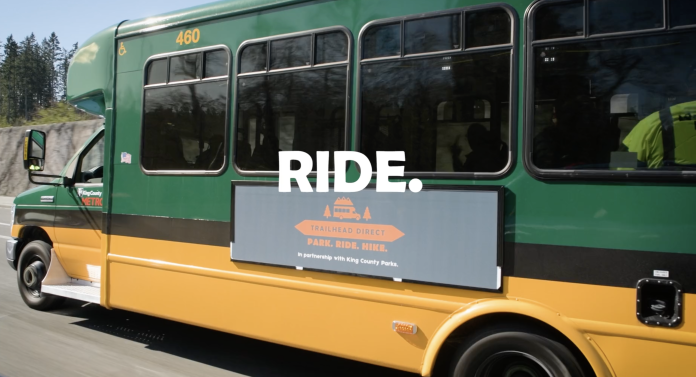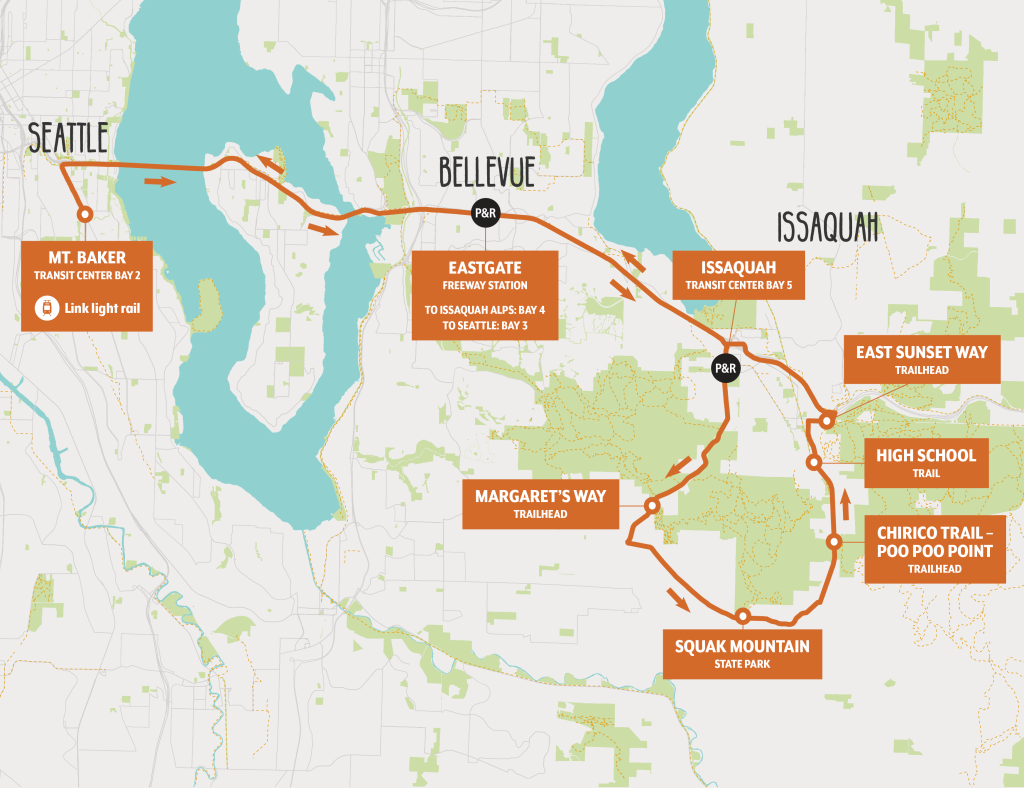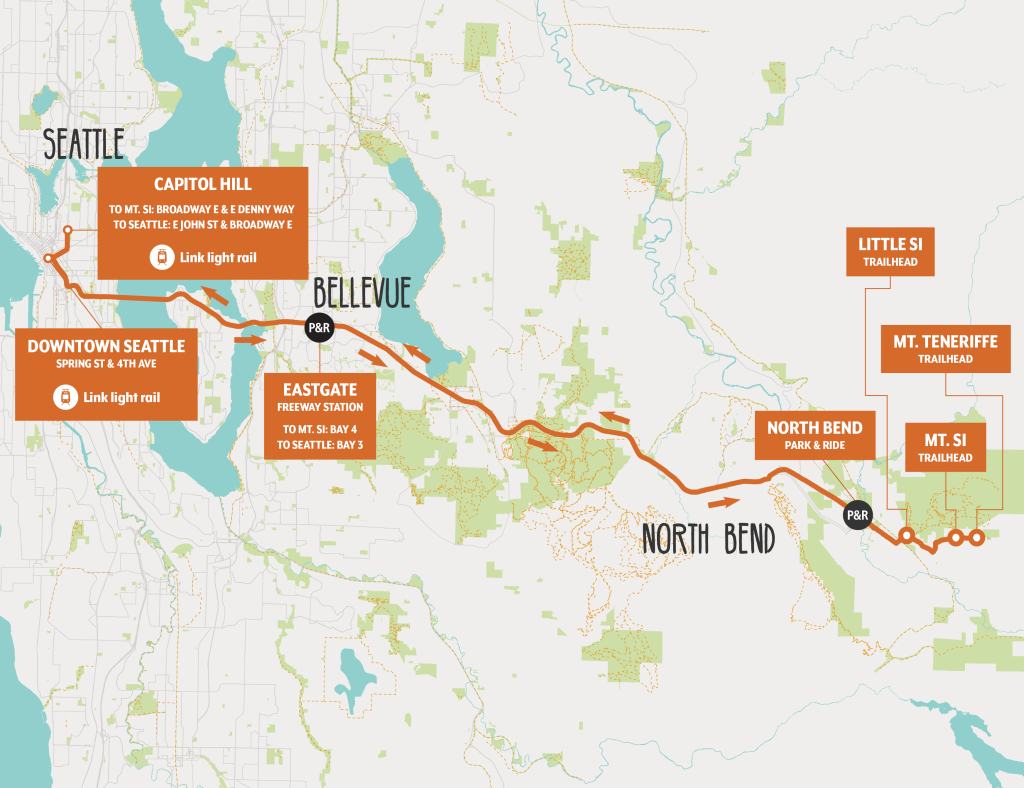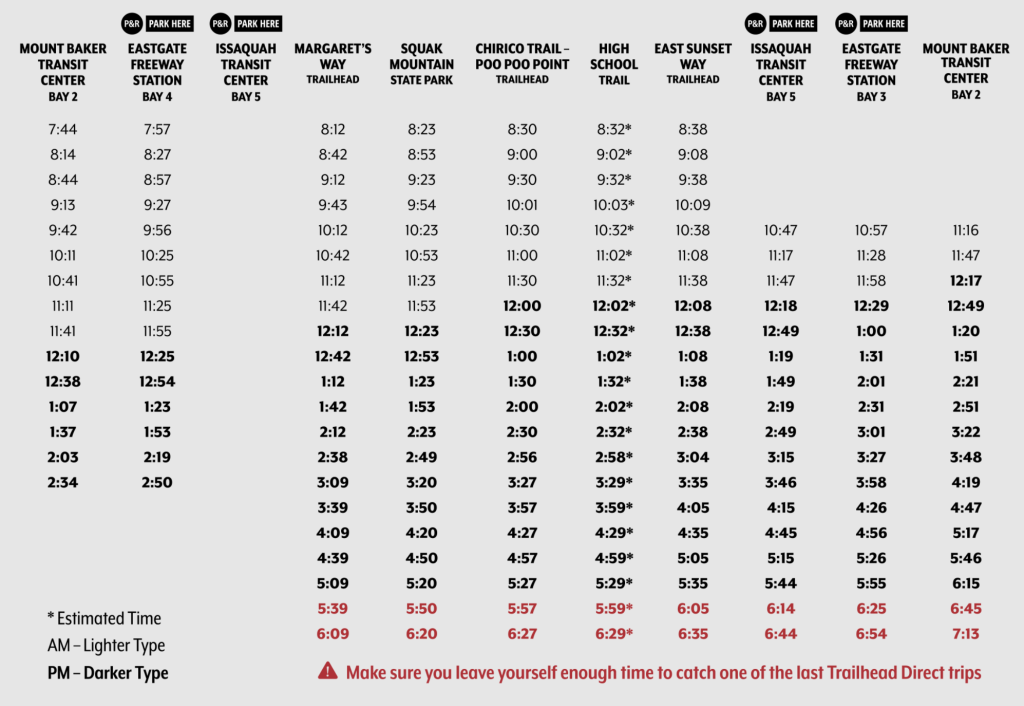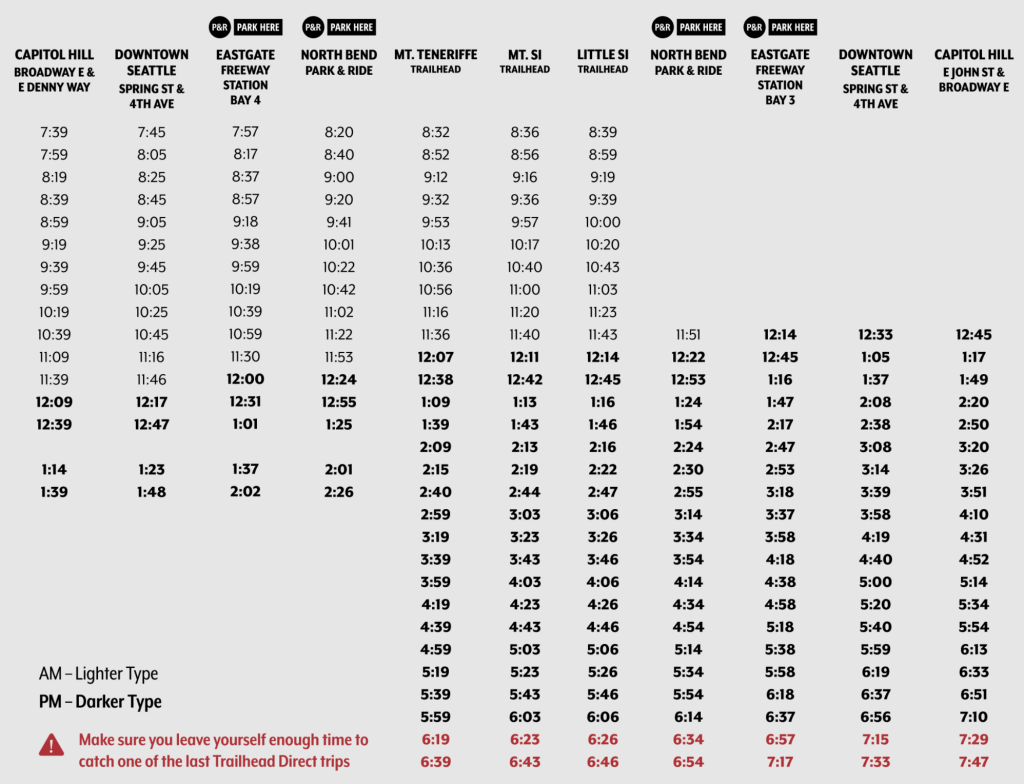King County Metro’s popular city-to-trail transit service — Trailhead Direct — is returning in June after a year’s-long pandemic-induced suspension. This year’s Trailhead Direct network will come with two routes serving Seattle, Bellevue, and Issaquah to popular hiking trailheads in the Issaquah Alps and near North Bend. That’s scaled-down from the offerings in 2019 when Trailhead Direct provided four routes, but with the pandemic still persisting and basic transit service only beginning to realize a bevy of ridership as Covid vaccination rates rise, the smaller network makes some sense.
When and where service will be provided
As a seasonal service, Metro operates the routes in spring and summer. This year, service will commence on June 5th and run through September 26th on weekends and holidays. Special holiday service includes Independence Day (observed July 6th) and Labor Day (September 6th).
The Issaquah Alps route will have three key stops to pick up riders for the trails. Those include Mt. Baker Transit Center in Seattle, Eastgate Freeway Station in Bellevue, and Issaquah Transit Center. Several transit services intercept those stops, offering regular connection options. Trailheads served by the route include Margaret’s Way, Squak Mountain State Park, Chirico Trail-Poo Poo Point, High School Trail, and East Sunset Way in that order since the route is operated a one-way loop from and to Issaquah Transit Center.
From Seattle, the Issaquah Alps route will run from 7:44am to 2:34pm with half-hourly departures to the trails. Return trips to Seattle from the trails every half hour will begin at 10:12am and wrap up at 6:09pm starting from the Margaret’s Way Trailhead.
The Mount Si route will feature seven stops — including five in Seattle — to pick up riders headed for trails near North Bend. Those include stops in Capitol Hill (Capitol Hill Station and Broadway/Pine St), First Hill (Madison Street/Summit Avenue and Madison Street/Boren Avenue), Downtown Seattle (4th Avenue/Spring Street), Eastgate Freeway Station in Bellevue, and North Bend Park-and-Ride. Local transit services will also connect with this route, except in North Bend.
Metro will serve three trailheads with the Mount Si route in order from Mount Teneriffe to Mount Si and then to Little Si as a loop from and to North Bend Park-and-Ride. From Seattle, service will run from 7:39am to 1:39pm with departures to the trails every 20 to 30 minutes. Return trips to Seattle from the trails will begin at 11:36am and wrap up at 6:39pm starting from the Mount Teneriffe Trailhead also with 20- to 30-minute frequency.
Committed hikers who want to do multiple trails can plan out their day with the schedules (see slider above) to tactically choose times and trails. It’s even possible to do a trail in the Issaquah Alps and then do one in the North Bend area — or vice versa — by transferring at the Eastgate Freeway Station.
About the service
Trailhead Direct first started service in 2017 as a partnership between Metro and King County Parks to reduce parking congestion at trailheads, provide more sustainable access, and connect hikers who are transit-dependent. Since then, the partnership grew prominently with the City of Seattle, corporate donors, and outdoor/environmental organizations. Other agencies that support the program include the City of Bellevue, City of Issaquah, City of North Bend, City of Renton, City of Tukwila, Eastside Fire and Rescue, Si View Metropolitan Park District, United States Forest Service, and Washington State Department of Natural Resources.
Metro uses transit vans that come in a variety of sizes, ranging from 13 seats to 27 seats. All vehicles are wheelchair accessible and are equipped with a bike rack capable of carrying a maximum of two bikes. This season, only mountain biking is only permitted at the East Sunset Way Trailhead in Issaquah.
Trailhead Direct charges regular Metro fares. For adults (aged 19 or older), the standard fare is $2.75. Reduced fares for youth (aged six to 18) and ORCA Lift are $1.50 and for Regional Reduced Fare Permit holders (seniors and disabled persons) are $1.00. Children aged five and younger ride for free. Riders can use their ORCA cards, cash, or the Transit GO mobile ticketing app to pay for rides. While Trailhead Direct is useful for trailhead access, riders aren’t required to go hiking and can use the transit van service for general trips.
Mobile transit apps like Google Maps, Transit, and OneBusAway should eventually include data for Trailhead Direct services allowing for on-the-fly trip planning. Metro’s own trip planner is another option. TOTAGO — a new partner — is also being touted by Metro as a trip planning option since the app integrates trail information with transit planning and allows for downloadable offline trail maps.
A spring and summer of hikes and adventure await transit riders. Go outside!
Article Note: This article has been updated to reflect additional stop information sought from Metro.
Stephen is a professional urban planner in Puget Sound with a passion for sustainable, livable, and diverse cities. He is especially interested in how policies, regulations, and programs can promote positive outcomes for communities. With stints in great cities like Bellingham and Cork, Stephen currently lives in Seattle. He primarily covers land use and transportation issues and has been with The Urbanist since 2014.


